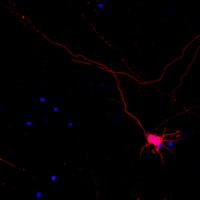Stress-activated protein kinase/c-jun N-terminal kinase phosphorylates tau protein.
Reynolds, C H, et al.
J. Neurochem., 68: 1736-44 (1997)
1997
Show Abstract
A proportion of the neuronal microtubule-associated protein (MAP) tau is highly phosphorylated in foetal and adult brain, whereas the majority of tau in the neurofibrillary tangles of Alzheimer's patients is hyperphosphorylated; many of the phosphorylation sites are serines or threonines followed by prolines. Several kinases phosphorylate tau at such sites in vitro. We have now shown that purified recombinant stress-activated protein kinase/c-Jun N-terminal kinase, a proline-directed kinase of the MAP kinase extended family, phosphorylates recombinant tau in vitro on threonine and serine residues. Western blots using antibodies to phosphorylation-dependent tau epitopes demonstrated that phosphorylation occurs in both of the main phosphorylated regions of tau protein. Unlike glycogen synthase kinase-3, the c-Jun N-terminal kinase readily phosphorylates Thr205 and Ser422, which are more highly phosphorylated in Alzheimer tau than in foetal or adult tau. Glycogen synthase kinase-3 may preferentially phosphorylate the sites found physiologically, in foetal and to a smaller extent in adult tau, whereas stress-activated/c-Jun N-terminal kinase and/or other members of the extended MAP kinase family may be responsible for pathological proline-directed phosphorylations. Inflammatory processes in Alzheimer brain might therefore contribute directly to the pathological formation of the hyperphosphorylated tau found in neurofibrillary tangles. | 9084448
 |










